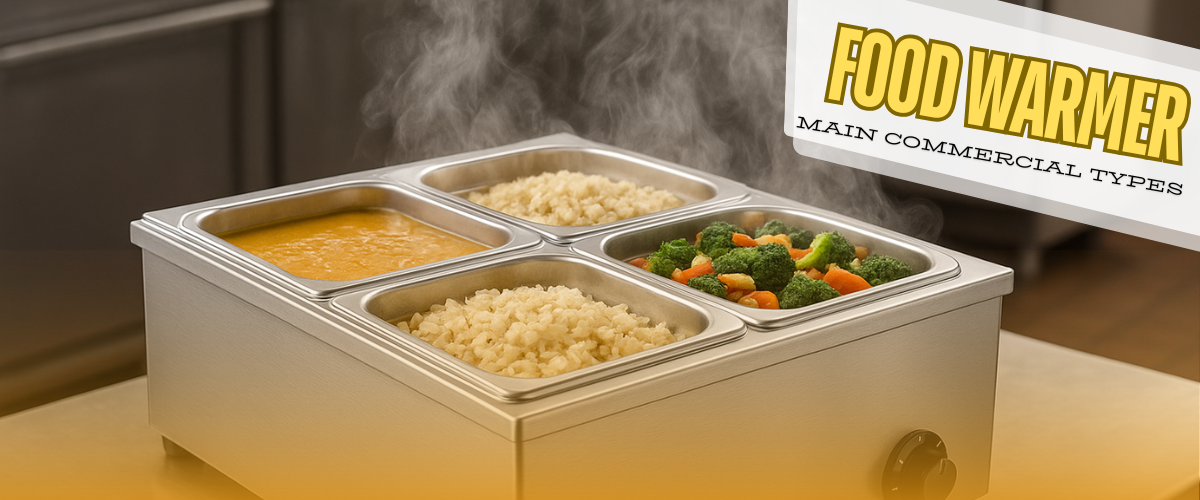Uudised
Kuumana hoidumine: ülevaade toidu soojas hoidjatest
Toidu sooja hoidmine on kohustuslik toiduvalmistamise valdkonnas
Ometi toiduvalmistamise ja -teeninduse kiireloomulises maailmas on ideaalse serveerimistemperatuuri hoidmine rohkem kui lihtsalt mugavus; see on kriitiline tegur toiduohutuses ja klientide rahulolu tagamisel. Õige kaubanduslik toiduainete soojendaja tagab, et toidud säilitaksid optimaalsed temperatuurid, säilitades tekstuur, maitse ja värskuse.
Kas tegemist on bufetijoone, hotelli hommikusöögibariga või restorani köögiga – pidev kuumutamine takistab toidu jõudmist ohtlikku temperatuurivahemikku (40°F ja 140°F vahel), kus bakterid aktiivselt kasvavad. Lisaks võimaldavad soojendajad šefidel ja teeninduspersonalil ette valmistada toite ilma kvaliteedi kaotuseta – säästes aega ja hoides töövoogude tõhusust.
Tänapäeva toiduvalmistamise tööstus toetub mitmesuguste uuenduslike seadmete kasutamisele, näiteks lauaseinte toidu soojendajad , toitude soojendajad , laualaua tüüpi toitude soojendajad , ja kaubanduslikud toitude soojenduskappid , kõik on kujundatud konkreetsete töövajaduste rahuldamiseks.
Peamised kaubanduslike toitude soojendajate tüübid
Aurulaud / Bain-Marie
Aurulaud, mida tuntakse ka kui Bain-Marie, on üks vanimaid ja usaldusväärsemaid toitude soojendamise süsteeme. See töötab kuumavee või auruga, et hoida toitu ohutul temperatuuril kuivendamata. Need on põhiosa bufetitel, hotellikontserdidel ja enesehoolduse toitlustusseadmetes.
- Peene, ühtlase soojendusega säilitatakse tekstuur ja niiskus
- Sobib kastmetele, supidele ja delikaatsetele roogadele
- Saadaval elektri- või gaasimudelitena
Sobib ideaalselt: Suuremahulised toimingud, mis nõuavad mitme roa jaoks pidevat temperatuuri reguleerimist.

Lauaseinte toidu soojendajad
Lauaseinte toidu soojendajad (nimetatakse ka laualaua tüüpi toitude soojendajad ) on kompaktne, ruumi säästv seade, mida kasutatakse restoranides ja kohvikuates, kus loetelpa on piiratud. Need kasutavad tavaliselt kuiva- või niisket kuumust ning sobivad kõige erinevasemate toitude – kastmetest kuni praetud toiduni – soojendamiseks.
- Kompaktne ja kaasaskantav
- Lihtne kasutada ja puhastada
- Sobib kasutamiseks teenindusalal või enesehoolduseks
Kasutusjuhu näide: Delikatessipoed, kus peab kiirtoitu ajal hoidma suppe, liimi või kõrvatoite soojana.
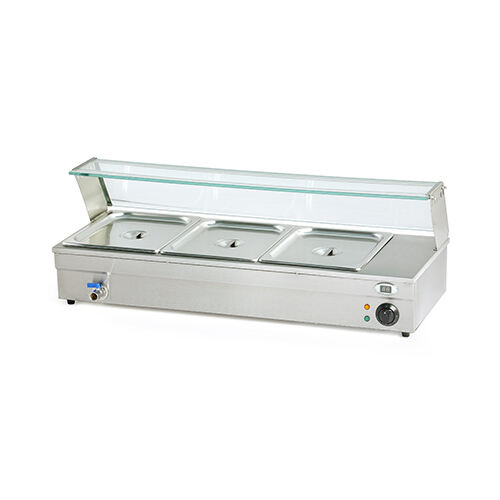
Kuumahoidmiskapid
The kaubanduslik toidu soojenduskapp —mida tuntakse ka kui kuumahoidmiskappi—on kateringumaailmas tõeline jõuet. See hoiab eelnevalt valmistatud toitu täpses serveerimistemperatuuris, samal ajal vältides dehüdratsiooni.
- Reguleeritavad niiskuse kontrollid
- Isolatsiooniehitus energiatõhususe tagamiseks
- Võib hoida mitut tassi või panni
Parimaks sobib: Suured kaubanduslikud köögid, bänkettiteenused ja asutused, kus on vaja toite valmistada suurtes kogustes.
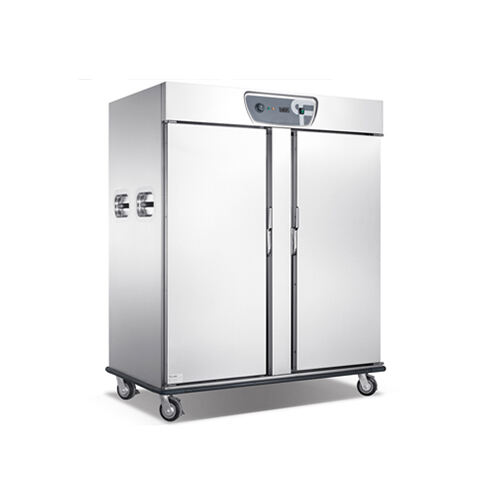
Supipotid
A supipoti on eriti disainitud selleks, et hoida suppe, kaste ja liimusi piisavalt soojana. See kasutab pehmet soojuse jaauru säilitamist, et vältida põletamist või kohustumist.
- Kompaktne ümmargune disain
- Ideaalselt sobiv enesehoolduspostidele ja bufetitele
- Pakub suurepärast visuaalset muljet
Tavalised rakendused: Kohvikud, bufetid, toidumootorrattad ja väiksemad toitekätted.
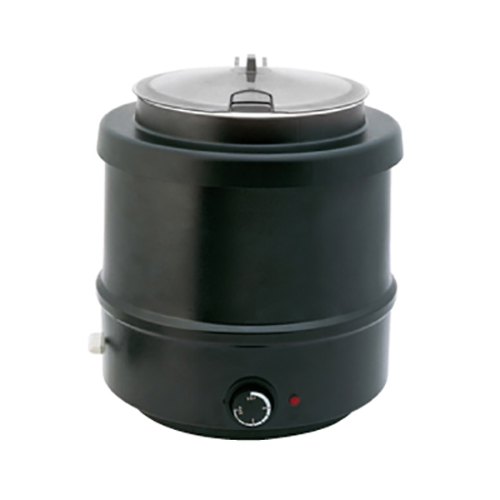
Soojenduskauss
Soojenduskauss on šefi saladuskülg. Nii professionaalsetes kui ka kodustes köökides leiduvad soojenduskaussid pakuvad diskreetset säilitamist ja kontrollitud soojuse hoidmist. Need kaussid soojendavad õrnalt rulle, kõrvaltoite või esitlusesse valmistoite enne serveerimist.
- Kompaktne, ruumi säästev disain
- Täpne temperatuuri reguleerimine
- Ideaalselt sobib küpsetiste ja esitlusesse valmistoitude jaoks
Sobib ideaalselt: Kõrgema klassi restoranid ja kondiitrikäid, kus prioriteediks on esitlus ja ajastus.
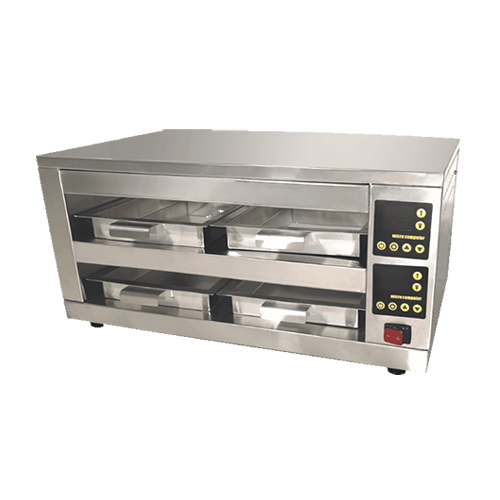
Võrdlustabel olulisematest kommertskasutuse toidusoojenditest
| TÜÜP | Soojendamismeetod | Parim | Eelised | Ideaalse keskkonna |
|---|---|---|---|---|
| Aurulaud / Bain-Marie | Auru / niiske soojus | Kastmed, lihakastmed, supid | Isegi kuumutamine, takistab kuivamist | Bufeet, hotellid |
| Lauaseinte toidu soojendajad | Kuiv või niiske kuumus | Kõrvaltoidud, kastmed | Kantav, lihtne puhastada | Kohvikud, väikesed restoranid |
| Kuumahoidmiskapid | Elektriline kuumutus + niiskuse reguleerimine | Suurkogused toidud, taldrikud | Suur mahutavus, täpne temperatuur | Bänkettisaalid, toidukoristus |
| Supipotid | Peene elektriline kütte | Supid, kastmed | Kompaktne, visuaalselt atraktiivne | Iseteenindusvoodid |
| Soojenduskauss | Elektriline kütte | Leib, plaatidel toit | Ruumi säästev, tõhus | Kondiitrikodud, restoranid |
Toitu soojenduslampid
Toitu soojenduslampid mängivad olulist rolli lahtistes köökides ja bufeet jooned need soojuskiirguslambid hoiavad toitu sooja infrapunakiirguse abil ilma otsese puutumiseta, säilitades krõbeduse ja tekstuur.
Need on eriti väärtuslikud kiiretempolis keskkondades, nagu kiirtoitmise restoranides ja lõikepostidel, kus värskelt valmistatud toidud peavad jääma soojaks esiletõstmise ja serveerimise vahel.
- Säilitab krõbeda tekstuur
- Kohene soojusreaktsioon
- Tõstab esiletulekut atraktiivse valgustuse all
Kuidas valida oma ettevõttele sobiv toidusoojendaja
Kui valid sobivaima toidusoojendaja või kaubanduslik toidu soojenduskapp , arvesta järgnevate teguritega:
- MENÜÜTÜÜP: Supid vajavad keedukastleid; küpsetised kasutavad kasuks tõmbelaaduritest.
- Saadaval olev ruum: Väikesed köögid toimuvad hästi lauapinnal asuvate seadmetega.
- Mahutarbimine: Suuremahulise toidukorralduse puhul tasub investeerida kappidesse või aurupadjadesse.
- Kandlikkus: Lauapinnale mõeldud ja lambil põhinevad soojendajad on ideaalsed mobiilseteks seadmeteks.
- Energiaallikas: Vali elekter stabiilsema kuumutuse jaoks või gaas suurema paindlikkuse saavutamiseks.
Hoidmise soovitused pikkuse jooksul
Õige hooldus tagab teie kaubanduslik toiduainete soojendaja jätkub aastaid tõhusas töös.
- Puhastage pannid ja paagid igapäevaselt
- Kontrollige termostaadi kalibreerimist
- Vältige üleliialist täitmist veega (aurumudelite puhul)
- Inspekteerige regulaarselt toitekaableid ja lüliteid
Hoolikalt hooldatud soojendaja pikendab mitte ainult seadme eluiga, vaid tagab ka toiduohutuse ja energiatõhususe.
KKK-d
1. Mis on ideaalne temperatuur kaubandusliku toidu soojendaja jaoks?
Enamik soojendajaid peaks hoidma toitu 140°F (60°C) või kõrgemal, et takistada bakterite kasvu.
2. Kas saan lauaseadetena kasutada vedelike, näiteks supi, soojendamiseks?
Jah, paljudel mudelitel on kaasas kaussid või panqid, mis sobivad vedelike jaoks. Veenduge lihtsalt õigetes veetasemes nende aurupõhiste üksuste puhul.
3. Kui sageli tuleb minu toitude soojendajat puhastada?
Soovitatakse igapäevast puhastamist – eriti pärast iga teenindusvahetust – ristinfektsioonide vältimiseks.
4. Kas toitude soojendavad lambid on energiasäästlikud?
Jah, kaasaegsed lambid kasutavad infrapunakiirgusi, mis tagavad järjepideva kuumutuse minimaalse võimsuskasutusega.
5. Millise suurusega komerts-toitude soojenduskappi ma vajan?
See sõltub teie toidukogusest ja menüü mitmekesisusest. Täissuurune kapp mahutab kuni 20 kaussi, samas kui poole suurusega seadmed on ideaalsed väikeste köökide jaoks.
6. Kas soojendusladed võivad toitu kuivatada?
Ei, kui hoolite niiskusest korralikult. Paljudel mudelitel on niiskuse reguleerimise seaded.
Kohustuslik väljaandmine
Kas teil on tegemist kõrgklassi restoraniga, kateringuteenuse või hotellbuffeega, investeerimine õigesse kaubanduslik toiduainete soojendaja teeb kõik selle erinevuse. Alates lauaseinte toidu soojendajad et toitude soojendajad , laualasetest , ja kappide süsteemidest , mängib igaüks olulist rolli kvaliteetsete, ohutute ja rahuldavate toitude pakkumisel.
Soojendajad pole vaid temperatuuri kohta – need puudutavad toiduohutust, maitset ja teeninduse suurepärasust. Valige hoolikalt, hooldage regulaarselt ning teie köök jääb alati kuumaks nii jõudluse kui maine poolest.
 Järelmüük:
Järelmüük:
 EN
EN
 AR
AR
 HR
HR
 NL
NL
 FI
FI
 FR
FR
 DE
DE
 EL
EL
 HI
HI
 IT
IT
 PT
PT
 RO
RO
 RU
RU
 ES
ES
 TL
TL
 ID
ID
 SL
SL
 VI
VI
 ET
ET
 MT
MT
 TH
TH
 FA
FA
 AF
AF
 MS
MS
 IS
IS
 MK
MK
 HY
HY
 AZ
AZ
 KA
KA
 UR
UR
 BN
BN
 BS
BS
 KM
KM
 LO
LO
 LA
LA
 MN
MN
 NE
NE
 MY
MY
 UZ
UZ
 KU
KU


